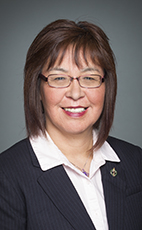Mr. Speaker, it is very important for me to stand up in the House today and take part in this debate, not only to speak for Attawapiskat, but also to highlight the challenges being met by the residents in my riding.
Before I begin, though, I want to share a personal story. Suicide has affected me and my family. My brother has had the challenge of losing three of his children to suicide in the past eight years.
Over the years, I have seen how both levels of government fail communities like La Loche by not providing services in mental health and other programs. This is a very touching, sensitive issue.
I have received many stories to share in this House and, before I begin, I want thank everyone who has shared their stories with me so that I could share them in the House of Commons. The personal stories are very sensitive, heartbreaking, and very sad. These stories also show the resilience and hope that exists in our communities and reserves across Canada.
The personal stories indicate that the first nations and Métis children, young people, and their families require immediate help and support. They need immediate help now and help in years to come. The personal stories indicate that first nations and Métis children across Canada are looking for us to give them hope. They are looking to the Canadian government for hope, and to industry, service providers, and all levels of government.
This first story comes from a health care provider in northern Saskatchewan. This health care provider had to travel 600 kilometres to Saskatoon from her community to seek help for her daughter, who had tried to kill herself in the previous few days. She could not find help in her own community because the existing health care services are inadequate and insufficient.
She, as a health care provider, struggled with getting a referral for a mental health specialist. I can just imagine how hard it is for people who do not have access to medical and other services. Not all families in northern Saskatchewan, Attawapiskat, and other communities have the resources to take their children to see specialists.
Reports from northern Saskatchewan, the far north, and other northern communities, indicate the lack of services and how poor these communities are.
Let me share another story, from a member of the Gitksan community in B.C. This person knows of over 100 suicide attempts in their community alone, and some were successful. The community was seeking to build a new arena so that the children could find a place to gather and play, without having to bargain with major companies to have it done.
This past weekend alone, I am very sad to say that there were more suicide attempts in La Loche. Since the shooting on January 22, 2016, I have stood before House of Commons parliamentarians requesting additional services from both levels of government. Unfortunately, help has not come from the many government levels.
Children and youth in La Loche and surrounding communities are showing signs of PTSD. They have no one to turn to and nowhere to go. The schools are doing what they can to provide services, sports, and recreational programs, but that is not enough. Families are left to fend for themselves and to try to take care of their problems, with no help from the health centre and no help from anywhere else.
Today another person wrote to me that the suicides and the attempted suicides across the country are a symptom of systemic failure, and I could not agree more.
Parents feel hopeless as they try to do their best to provide for their children. We live in Canada. We should not feel hopeless, and yet our first nations and Métis communities across Canada feel hopeless. We can speak to the issues of a lack of cultural and recreational facilities and programs, the high rate of unemployment and poverty, poor housing, poor infrastructure, the high cost of food, high cost of living, and no mental health supports or other services.
Communities like La Loche, Attawapiskat, Cross Lake, Gitksan, and others across Canada, require help, not band-aid solutions. It is nice to get visits, but that is not good enough. We need concrete help. We need more funding to assist our communities across Canada to make sure we are helping our young people and their families deal with the problems at hand.
Some examples by the residents who shared their stories include language immersion programs and retention programs, in Dene, Cree, Michif, and other first nation languages. Other suggestions are for more cultural and recreational facilities to keep young people and their families busy.
Cindy Blackstock has a dream for Canada's birthday: a country where first nations children no longer have to fight for equality. I share her dream, but we cannot wait until next year. We have to fight for them now. We cannot lose any more of our children to suicide in Attawapiskat, Le Loche, and beyond.
The government promised to implement the Truth and Reconciliation Commission's recommendations in its entirety. This is the time to act because it is 2015. Oh, I forgot; it is now 2016.

